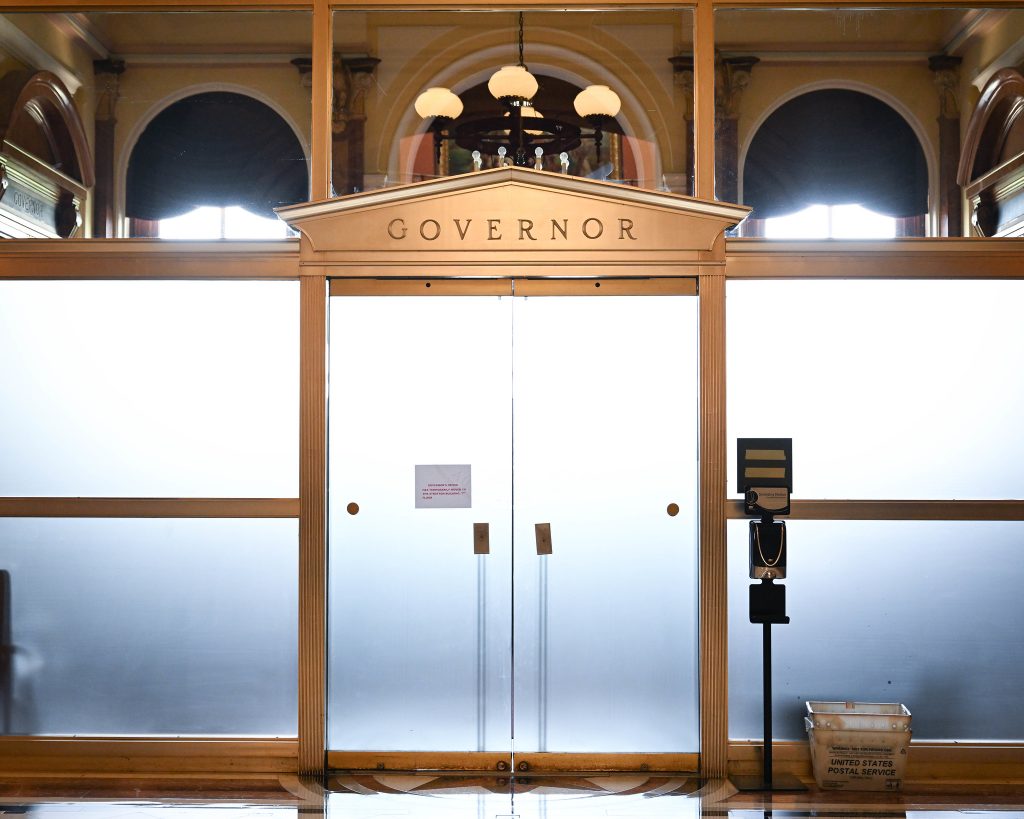STATE GOVERNMENT
DFPR responds to House Republican pressure, announces first phase of plan to modernize professional licensing. The Illinois Department of Financial and Professional Regulation (DFPR) is the State agency that oversees the issuance of licenses for working professionals. Repeated delays and failures with the archaic licensing system has created a cascade of increasingly severe problems for licensed professionals.
Until a few decades ago, DFPR accepted license applications on paper, and issued paper licenses to people holding various professional positions ranging from M.D. physicians to nail technicians. With the advent of computers in the late 20th century, DFPR moved to a first-generation process of partially electronic licensure. The then-new process used an operating system or systems that assumed that computerized records would continue to be kept on 1970s-era mainframe computers. Furthermore, in many individual professions, applicants were allowed to continue to submit paper applications, creating data sets that had to be scanned or transcribed into DFPR’s primitive computer system.
This first-electronic-generation DFPR process has been added to many times, including numerous add-ons and additions intended to create database security firewalls. DFPR licensure software is currently aging, dysfunctional, and well past the end of its useful life. Many Illinois licensed professionals have talked to their lawmakers, including House Minority Leader Tony McCombie, about the problems they are finding when they submit an application to the DFPR for a license or a license renewal. In some cases they have to wait months for these all-important documents to be completed. State Representative Mike Coffey issued this statement:
“We have incredible people seeking professional careers in Illinois, but waiting months to obtain their license to work is depriving them from earning a paycheck. The result of poor policy is driving workers to other states and creates a barrier for economic growth. We must have bipartisan support to fix an ongoing issue that affects workers in Illinois.”
With House Republican pressure serving as a key part of the legislative process, the General Assembly eventually demanded action. In the 2023 veto session, the legislature passed HB 2394, a measure that made major amendments to the law governing DFPR and its operations. The new law instructed DFPR to switch out its old licensure computer system. The law also instructs DFPR to buy new software to implement the licensure laws of the State of Illinois. The legislative intent of this measure is to move DFPR’s licensure software into an all-electronic, cloud-based, verified-password system for data storage and rapid retrieval. A system of this type operates in line with what has become the universal standard for secure global databases.
The Department at first dragged its feet in response to this new State law. They reported difficulties in procuring new software and complained of snags in transferring the data contained in existing and ongoing licensure databases from the old system to the proposed new system. The Department now reports, however, that these difficulties are beginning to be resolved. The new DFPR Comprehensive Online Regulatory Environment (CORE) will give Illinois residents the opportunity, working from home, from an office, or from a mobile device, to log into a secure, password-access-controlled system. Once there, they can interact directly with the DFPR database. This will reduce the need for human DFPR personnel supervision of the paperwork associated with the intake of a license application, will improve DFPR productivity, and will speed up the licensure turnaround times for those professions selected for admission to the new process.
As of December 2024, the DFPR CORE system is still being rolled out. It is open only to new professional licensure applications in the following three professions:
- Clinical psychologist
- Music therapist
- Nail technician
Additional professions will be rolled into CORE in what is expected to be a two-year process. Illinois professionals and licensure applicants may need to continue to work with their lawmakers to ensure that other professions are moved to the new user-friendly application process in a speedy and functional manner.
BUDGET
Illinois income tax receipts continued their pattern of year-over-year stagnation and decline in November 2024. Illinois’ largest single source of funds for general revenue spending purposes are the taxes paid on incomes reported by individuals ($1,775 million in November 2024) and corporations ($134 million). The $1.9 billion in November 2024 income tax receipts represented a decline of $90 million in 30-day cash flow compared to November 2023.

The November 2024 tax receipts, which are reported by the Illinois Department of Revenue (IDOR) to the nonpartisan Commission on Government Forecasting and Accountability (CGFA), generates continued pressure on State agencies and on the Governor’s Office of Management and Budget (GOMB). These entities are tasked with ensuring that the FY25 budget remains balanced as is required by the Illinois Constitution. GOMB and the Gov. Pritzker agencies must also address a projected $3.2 billion deficit in Fiscal Year 2026 (July 2025 – June 2026). The 104th General Assembly will grapple with the upcoming budget deficit during the 2025 legislative spring session; the session is scheduled to adjourn on May 31, 2025.
Looking for answers to this emerging pattern of stagnant, declining income tax receipts, CGFA staff has looked at patterns of Illinois employment. The time periods looked at were 30-day and 31-day monthly periods ending in October 2024. Personal income taxes, paid by employed Illinoisans by automatic withdrawals from paychecks, are the largest single component of Illinois general funds cash flow. These key revenue numbers closely track Illinois employment figures.
Working with the federal Bureau of Labor Statistics (BLS), CGFA found that many Illinois metro areas are displaying patterns of stagnant or declining payroll employment. These numbers are particularly significant when October 2024 paycheck numbers are compared with the totals compiled five years earlier, in October 2019, just prior to the March 2020 pandemic outbreak. These five-year numbers erase the effects of pandemic layoffs and hire-backs, and present a data set for the analysis of long-term Illinois employment trends.
The BLS data, republished by CGFA, indicates that only two of the 13 major Illinois metro areas surveyed for job numbers showed significant employment growth over the five-year period. Four other areas, including Chicago, demonstrated stagnancy patterns in which local paychecks increased in amounts ranging from 0.1% to 1.2% over the five-year period. Seven of the 13 Illinois areas, including the suburban area of Lake County and the major Downstate metro area of Peoria, actually posted declining job numbers during this five-year period.
The stagnant Chicago job pattern did not offer much hope that the Windy City would be able to keep up with the other major metro areas of the U.S. The Chicago-area job growth rate during this five-year period was 0.3%, equivalent to an annual growth trend of 0.05%/year. Chicago continues to fall behind other major American metro areas that enjoy equivalent or superior standing as centers of inland U.S. finance, management, and distribution. Examples of these fast-growing metro areas include Atlanta, Dallas, Denver, Houston, and Nashville. As Chicago continues to lose market share to these rival cities, the overall Illinois economy is unlikely to produce a pattern of healthy revenue growth. This pattern of revenue stagnation does not match up with the hypothetical flow of future cash that many Illinois Democrats are counting on to finance the spending hikes that many of them yearn to enact.
JOBS
Lion Electric school bus assembly plant shuts down. With much fanfare the Channahon assembly floor, located on a site adjacent to Joliet, began a planning process in 2021 and officially opened in July 2023. The Pritzker administration has put major emphasis on the enactment of stimulus laws, including taxpayer-funded subsidies, to encourage a transition away from fossil fuels into what is called “green energy.” The electric-battery-powered school buses assembled by Lion Electric were slated to be part of this transition.
However, battery-powered school buses have proven to be a severe disappointment for many of the school districts and transportation service providers that have acquired them. The start-and-stop movement of a school bus is not well-suited to electric motoring, especially in the chilly environment of the northern U.S. in winter. After a relatively short period of time in production and sale, school districts and transportation service providers stopped buying Lion Electric’s school buses. With little cash flow, the firm ran into severe financial difficulties. Most of the firm’s Joliet workers stopped getting paychecks, and were laid off. Joliet employment dropped to less than 30 remaining employees, and the massive 900,000-square foot assembly floor emptied out.
Challenges continued for Lion Electric. This week, Lion was trading as a “penny stock” priced at pennies a share. The struggling firm has told workers that it was completing the suspension of its Channahon-Joliet assembly plant, which will complete the layoff of its Illinois workforce. The factory suspension became public news on Monday, December 2. The State deal with Lion Electric included a potential $50 million in subsidies tied to worker payroll taxes, although no actual money had been paid out as of December 2024.
FIREARMS
Appeals court keep Illinois’ gun ban in place as case proceeds. Illinois’ gun and magazine ban will stay in effect pending the outcome in the Seventh Circuit U.S. Court of Appeals, the appeals court ruled Thursday.
Illinois banned the sale and possession of more than 170 semi-automatic firearms and magazines over certain capacities in January 2023. Lawsuits in federal court followed, challenging the ban based on the Second Amendment right to keep and bear arms and other grounds.
Four cases in the Southern District of Illinois were consolidated into Barnett, et al. v. Raoul, et al.
After preliminary issues went all the way to the U.S. Supreme Court, Justice Clarence Thomas said the case was not ripe because it was not on final judgement. The Southern District of Illinois consequently found the law unconstitutional. Judge Stephen McGlynn issued an injunction against the law last month but put a 30 day hold on his order. That stay would have lifted Dec. 9.
The state appealed to the Seventh Circuit U.S. Court of Appeals, asking for a continued stay. The appeals court ruled Thursday McGlynn’s injunction will be held and the state’s gun ban will “remain in force until this court issued its mandate.”
Read more from The Center Square.
